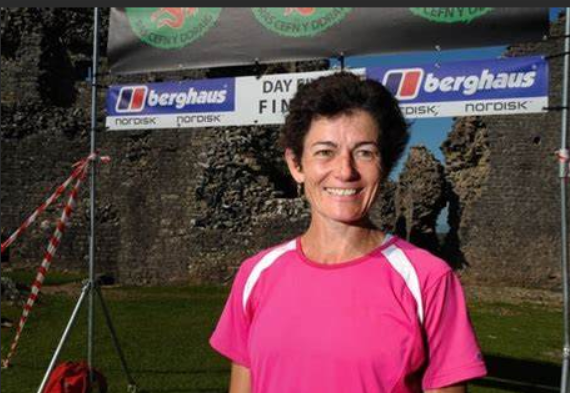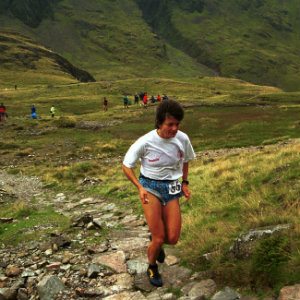Helen Diamantides had a superb career as an endurance runner. It’s hard to categorise her as simply a hill runner although she was a Scottish internationalist there, you can’t by any stretch of the imagination have her marked as a track runner, she was an international cross country runner but ran well over long distances (VERY long distances), set world records, competed in the Island Peaks Race with distinction and demonstrated an all-round versatility in endurance events in at least three continents. Colin Youngson has written a good overview of her career that we can look at before going into more detail. He writes:
The Carnethy Hill Runners Hall of Fame lists some of Helene’s main hill running achievements (others have been added here):
Diamantides, Helene:
In 1988 she won both the women’s events in the 31 km Mount Cameroon race and the Mount Kinabalu race in Borneo.Bob Graham Round 1988: Woman’s record set.
Paddy Buckley Round 1989: Outright record set (2 hours faster than the Men’s)Charlie Ramsay Round 1989: Woman’s record set.
GB Mountain Running International 2003 (team bronze medal)
Scottish Hill Running International
Scottish Ladies Hill Running Champion 1993 (for Westerlands CCC)
Lakeland Classic Ladies Champion 2006
Former holder of Everest base-camp to Kathmandu record 1987
Overall winner of first Dragons Back race in 1992; first Woman in 2012
Helene was born in North Yorkshire in 1964, but lived in Ghana and then Greece (where, as a teenager, she competed internationally in the pentathlon) before returning to England and Durham University, where she took up fell running.
In 1996, she graduated from Glasgow Caledonian University as a Bachelor of Science in Physiotherapy. While studying in the city, Helene raced for Westerlands CCC at cross-country and hill running. She trained more seriously, influenced by GB international triathlete and hill runner Jack Maitland and especially Martin Hyman, a former British 10,000m international and excellent orienteering coach. Consequently, Helene became a much better athlete. She won the 1995 Scottish West District cross country title and felt honoured to run for Scotland at cross country.
Naturally, she was selected to race for Scotland in the 1995 World Mountain running Trophy in Edinburgh.
For Great Britain, she contributed to two team bronze medals (1996 and 1997) in the IAU European 100 Kilometres Road Championships. She said later, “At the time, I was running for Fife AC, and the club supported me brilliantly. On Sunday runs, half the runners would come out for the first couple of hours with me and we would meet the other half at my house and they would do a couple more hours training with me. I fed them all afterwards.”
In 1987, Helene and fellow fell-runner Alison Wright went to Nepal to attempt to break the record for running from Everest Base Camp to Kathmandu. This is a 188-mile (303 km) route which includes 42,000 feet (13,000 m) of ascent. Both women completed the route in a record of 3 days, 10 hours.
How far were some of her longer hill events? Like ‘The Big 3 Rounds’ she completed in 1989. Here are some details from Wikipedia:
The Bob Graham Round is 66 miles long, over 42 Lake District Peaks. Helene’s time was 20 hours 17 minutes
The Paddy Buckley Round is just over 100km long, over 47 summits in Snowdonia, Wales. Helene’s time was 20 hours 8 minutes.
The Ramsay Round is 58 miles long, over 24 summits (including 22 Munros) with a total climb of around 28,500 feet. Helene’s time was 20 hours 24 minutes
In 1992, with Martin Stone, Helene Diamantides entered The Dragon’s Back Race a new 220-mile (350 km) five-day race across the length of Wales; she and Stone won the race in 38 h 38 min. This event was held again in 2012, and Helene Whitaker finished fourth overall and First Woman.
Helene won the Borrowdale Fell Race four times; set a course record in the 1990 Wasdale Fell Race; and set another record in the 1992 Langdale Horseshoe.
Representing Scotland, she raced in the European Mountain Running Trophy in 1999 and 2000, finishing second Scot on both occasions.
In the World Mountain Running Trophy, for Scotland, she was first Scot in 1993 (29th overall) and 1994 (25th). She finished second Scot in 1995 (21st), 1997 (17th) and 2000 (38th)
In 2003, she ran for Great Britain in the World Mountain Running Championship (held in Trento, Italy) and contributed to team bronze medals.
Helene has said the following (in her chapter of the excellent book ‘It’s A HILL, get OVER IT’ by Steve Chilton):
As to inspirations, Helene cites Ros Coats, mostly for the way she broke down boundaries and her attitude. Helene admits to being desperately competitive: “I am glad I found a sport where that is okay in females. Anyone in front of me I would have a go at. The pleasure is being out there, if I can win so much the better. If I do my best, that is better than winning.”
She admires and is impressed by Angela Mudge: “Her statistics impress me. She is so far under any other woman’s percentage off the men’s records, which is absolutely outstanding. Helene reckons that her ability to run uphill and downhill has changed over time. She was definitely a downhill demon. She used to love hammering down the hills, and could catch most people, men included. Now she counts on being able to climb past people. Physiological testing proved that, although her VO2 max was not high, she could sustain a high level of performance, close to the threshold, for very long periods of time. “I was just incredibly efficient. I use a Heart Rate monitor now to keep close to the maximum but not to go over it, to get the best out of myself.” Her greatest achievements? “Dragon’s Back certainly is what I am built for, physiologically as well as psychologically. The strategy of trying to get yourself from A to B in good nick day after day, that suits me, I enjoy it. I really enjoyed my solo unsupported Bob Graham Round. It was probably the best day out in the hills I ever had. I was running at my pace, I didn’t feel pushed really, I could eat when I wanted to, not when the pacers wanted.”
“Getting a Scottish vest at cross-country was a real honour. I am old-fashioned in that when I put on a vest I will kill myself as it is such an honour to be selected. Even being selected by Yorkshire at the age of 47 was a real thrill.”
Even a quick look over the information above will indicate that it could not be covered completely without a much longer piece than is possible here. We will however look at some of her exploits a bit more closely to learn more about the character of the athlete.
A bit more detail The Rounds The Scottish Island Peaks Race Representative Appearances The Dragon’s Back

